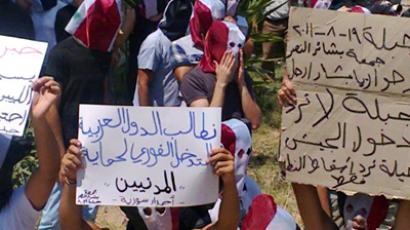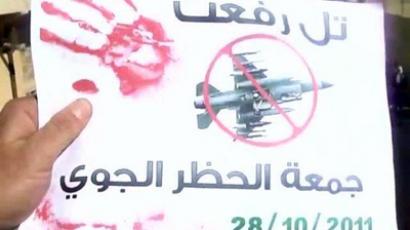‘Gulf countries conspiring to topple Assad'
There is a conspiracy involving regional powers that is aimed at overthrowing the Assad regime in Syria, warned Beirut-based political analyst Kamel Al Wazne.
He argued that Syria’s neighbors are getting involved in the country’s political process out of a personal vendetta again President Bashar al-Assad."As you can see, the regional powers haven't been neutral with the situation that is taking place inside Syria," Al Wazne told RT. "Actually, some of these countries have been fueling weapons and money and a certain ideology to topple Assad's regime.The reason, Al Wazne says, is simple.“President Assad has taken a very strong position in the past, supporting the resistance in Lebanon, Iraq and Iran and the idea of a regional alliance against Israel,” he stated. “Certain regional powers – namely Turkey, Saudi Arabia and Qatar – don't like that."Still, Al Wazne sees Assad’s position as a strong one.“The president still has the biggest support in Syria, we have seen millions turning up to support him,” he said. “And he acknowledges that there is opposition in the country asking him for change. That's why we are having constitutional reform. But there are also external powers – the so-called opposition in exile. Those are backed by the West and some Persian Gulf countries.”Direct NATO involvement, he warned, would be unwise.“I think any attempt by the US or a Western power may backfire, as the situation in Syria is much different from the one in Libya,” he said. “We have to remember Muammar Gaddafi had a peace deal with the West, he had given everything he has to the US, setting up cooperation with the US intelligence and putting his money with the US, and they turned against him. The Syrian are more capable, unified and determined, they have the capability and the means to defend their country. The West knows that Syria will not be left alone in any confrontation.”Canadian war correspondent Scott Taylor agrees with Al Wazne."Syria is a little different in terms of geographic fault lines [from Libya],” Taylor told RT. “Any external involvement would have the potential to reverberate in the entire region. Iraq is not stable. The US is pulling out its troops, they are looking to relocating forces to Kuwait so they can still maintain some control over the area. Turkey has launched an incursion into northern Iraq [to] hunt the Kurds, and there is a Kurdish minority in Syria as well. Israel is on the border. You have got all kinds of things which would make it very hard to go in there and make a less-than-volatile situation."
Russian lawmakers, who went on a fact-finding mission to Syria recently, concluded that Damascus is indeed carrying out the democratic reforms it promised, and Al Wazne hopes the country can solve its problems without Western interference.“The president will try his best to [unite] the country around him,” he said. “But the West have a vendetta against Assad, and thus we have to wait and see. There is a determination in the president and the Syrian people to find closure. But the conspiracy in my estimate will continue to act against the Assad regime.”According to UN estimates, over 3,000 people – from both the opposition and Syrian law enforcement – have died since the violence broke out in March. Damascus says soldiers and police account for 1,100 of the dead.














